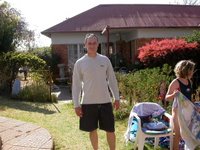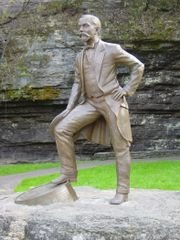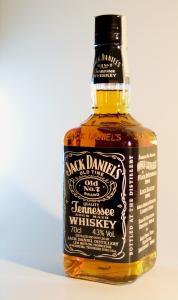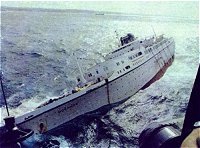While surfing the internet looking for articles on the Oceanos, I came across this one written by Barry James. By Barry James International Herald TribuneThursday, Aug. 8, 1991
The captain of the Greek cruise liner Oceanos said Wednesday he was satisfied that he had carried out his duties effectively in the rescue of all 571 passengers and crew when the ship sank off the coast of South Africa on Sunday, and he added that he could not understand why some passengers were now attacking him.
.
The captain, Yiannis Avranas, denied that he had abandoned ship. He said he had supervised the rescue operation from a helicopter hovering over the sinking vessel after going ashore to reestablish communications.
.
Asked about a report that he had gone into hiding to avoid angry passengers, Captain Avranas replied from his hotel in Durban, South Africa: "Hide? Of course not. Why should I hide myself? I am not a killer. I cannot understand why passengers are upset because they are alive. This is unbelievable." Captain Avranas said he had known when he left the ship some hours before it sank that there were 170 passengers and crew still aboard.
.
But, in a telephone interview, he added that leaving the ship before the passengers - including many elderly people - had been evacuated was the only way that he could ensure the safety of all those aboard.
.
When he left, he said, the ship was in darkness and the batteries on the crew's walkie-talkies had died, meaning that he had no communications with his crew or with other rescue craft. He had no way of knowing what had happened to passengers who had been evacuated aboard lifeboats.
.
He said he had been as concerned about the 400 people who had left the ship as about those who remained aboard.
.
"But no one asked me about this until now," Captain Avranas said. After checking the situation from the shore, he said, he flew back to the ship on a helicopter, intending to go back on board. But the weather was so bad that the helicopter crew advised against boarding. He said he therefore stayed aboard the aircraft while remaining passengers and crew were winched off the ship. He said he stayed until he was sure that the ship was completely evacuated and that all the lifeboats had been accounted for.
.
Asked about the maritime tradition that the captain stays with his ship, Captain Avranas said: "That is correct - he must stay and be sure that everybody is safe. And that I did. I did not allow anything else to cross my mind."
.
Speaking hoarsely and in halting English, Captain Avranas said he did not understand why reports in the South African and international press had been so hostile. He added that rather than seeking out his version of events, local reporters had allowed their imaginations to run wild.
.
"I never spoke with any of these newspapers," he said. "They write these things because they don't understand or they don't want to understand."
.
Asked to comment on a report in the Cape Times that he had pushed an elderly woman out of the way in order to board a helicopter, the captain said the account was "imagination."
.
"Of course it is not true," he said.
.
"From my point of view, the rescue was perfect," he said. "Maybe in the last moments it did not go according to my plans, but this does not mean I am guilty."
.
Captain Avranas, 51, who has been an officer for 20 years and a seamen for 30, said he would have preferred to evacuate everyone aboard the lifeboats, but this proved impossible in the high winds and heavy seas.
.
The ship then began listing as flooding gained on the pumps, making it impossible to launch the lifeboats, he said.
.
Once the lifeboats had been launched, Captain Avranas said, he hoped that help would come from land, but none did. He said he had wanted other ships in the area to form a windbreak around his stricken vessel so that he could evacuate more passengers by lifeboat, but was unable to organize this.
.
Once the last lifeboat had left, at about 3 A.M. Sunday, those still aboard the Oceanos had to wait until dawn, about 7 A.M., for the first helicopters to arrive. Captain Avranas said people were calm during this period and sang on the deck.
.
While waiting for the helicopters, he said, many plans had run through his mind.
.
"My first concern was to find out if all the people were alive," he said, "because I had heard many stories over the walkie-talkies. I also wanted to make sure of getting help from the other side."
.
Meanwhile, he said, "members of the crew almost killed themselves" to rescue the passengers."
.
Of his critics, Captain Avranas said, "I'm sorry, but I don't think they have ever been on a ship, or know what sea life means."
.
As part of an official inquiry into the incident, Captain Avranas and other crew members have been answering investigators' questions. A spokesman for the Department of Maritime Affairs at the Transport Ministry in Pretoria said a preliminary statement would be issued Thursday.
.
Captain Avranas denied a report that there had been a previous flooding incident aboard the ship last month. Although he has been quoted as saying that the disaster was caused by a thrown piston, he said he did not know what had caused the flooding.
.
"I think it was the best ship I ever had, a very strong ship," he said.
.
In Athens, Joanna Despotopoulou, a spokeswoman for the Epirotiki Lines, the owner of the ship, said the Oceanos had gone into dry dock for a two-month overhaul, following a round-the-world cruise carrying Japanese peace activists. She said the ship had the highest possible safety rating at Lloyd's Register of Shipping.
.
But a member of the family that owns the line was quoted anonymously by The Associated Press as expressing concern that the company had lost three ships in three years.
.
"We're asking ourselves what is happening, that one misfortune follows another," he said.
.
Mrs. Despotopoulou said, however, that there was no connection between the sinking of the Oceanos, a fire aboard the Pegasus, the company flagship, in Venice in June and the sinking of the liner Jupiter in Piraeus three years ago.
The captain of the Greek cruise liner Oceanos said Wednesday he was satisfied that he had carried out his duties effectively in the rescue of all 571 passengers and crew when the ship sank off the coast of South Africa on Sunday, and he added that he could not understand why some passengers were now attacking him.
.
The captain, Yiannis Avranas, denied that he had abandoned ship. He said he had supervised the rescue operation from a helicopter hovering over the sinking vessel after going ashore to reestablish communications.
.
Asked about a report that he had gone into hiding to avoid angry passengers, Captain Avranas replied from his hotel in Durban, South Africa: "Hide? Of course not. Why should I hide myself? I am not a killer. I cannot understand why passengers are upset because they are alive. This is unbelievable." Captain Avranas said he had known when he left the ship some hours before it sank that there were 170 passengers and crew still aboard.
.
But, in a telephone interview, he added that leaving the ship before the passengers - including many elderly people - had been evacuated was the only way that he could ensure the safety of all those aboard.
.
When he left, he said, the ship was in darkness and the batteries on the crew's walkie-talkies had died, meaning that he had no communications with his crew or with other rescue craft. He had no way of knowing what had happened to passengers who had been evacuated aboard lifeboats.
.
He said he had been as concerned about the 400 people who had left the ship as about those who remained aboard.
.
"But no one asked me about this until now," Captain Avranas said. After checking the situation from the shore, he said, he flew back to the ship on a helicopter, intending to go back on board. But the weather was so bad that the helicopter crew advised against boarding. He said he therefore stayed aboard the aircraft while remaining passengers and crew were winched off the ship. He said he stayed until he was sure that the ship was completely evacuated and that all the lifeboats had been accounted for.
.
Asked about the maritime tradition that the captain stays with his ship, Captain Avranas said: "That is correct - he must stay and be sure that everybody is safe. And that I did. I did not allow anything else to cross my mind."
.
Speaking hoarsely and in halting English, Captain Avranas said he did not understand why reports in the South African and international press had been so hostile. He added that rather than seeking out his version of events, local reporters had allowed their imaginations to run wild.
.
"I never spoke with any of these newspapers," he said. "They write these things because they don't understand or they don't want to understand."
.
Asked to comment on a report in the Cape Times that he had pushed an elderly woman out of the way in order to board a helicopter, the captain said the account was "imagination."
.
"Of course it is not true," he said.
.
"From my point of view, the rescue was perfect," he said. "Maybe in the last moments it did not go according to my plans, but this does not mean I am guilty."
.
Captain Avranas, 51, who has been an officer for 20 years and a seamen for 30, said he would have preferred to evacuate everyone aboard the lifeboats, but this proved impossible in the high winds and heavy seas.
.
The ship then began listing as flooding gained on the pumps, making it impossible to launch the lifeboats, he said.
.
Once the lifeboats had been launched, Captain Avranas said, he hoped that help would come from land, but none did. He said he had wanted other ships in the area to form a windbreak around his stricken vessel so that he could evacuate more passengers by lifeboat, but was unable to organize this.
.
Once the last lifeboat had left, at about 3 A.M. Sunday, those still aboard the Oceanos had to wait until dawn, about 7 A.M., for the first helicopters to arrive. Captain Avranas said people were calm during this period and sang on the deck.
.
While waiting for the helicopters, he said, many plans had run through his mind.
.
"My first concern was to find out if all the people were alive," he said, "because I had heard many stories over the walkie-talkies. I also wanted to make sure of getting help from the other side."
.
Meanwhile, he said, "members of the crew almost killed themselves" to rescue the passengers."
.
Of his critics, Captain Avranas said, "I'm sorry, but I don't think they have ever been on a ship, or know what sea life means."
.
As part of an official inquiry into the incident, Captain Avranas and other crew members have been answering investigators' questions. A spokesman for the Department of Maritime Affairs at the Transport Ministry in Pretoria said a preliminary statement would be issued Thursday.
.
Captain Avranas denied a report that there had been a previous flooding incident aboard the ship last month. Although he has been quoted as saying that the disaster was caused by a thrown piston, he said he did not know what had caused the flooding.
.
"I think it was the best ship I ever had, a very strong ship," he said.
.
In Athens, Joanna Despotopoulou, a spokeswoman for the Epirotiki Lines, the owner of the ship, said the Oceanos had gone into dry dock for a two-month overhaul, following a round-the-world cruise carrying Japanese peace activists. She said the ship had the highest possible safety rating at Lloyd's Register of Shipping.
.
But a member of the family that owns the line was quoted anonymously by The Associated Press as expressing concern that the company had lost three ships in three years.
.
"We're asking ourselves what is happening, that one misfortune follows another," he said.
.
Mrs. Despotopoulou said, however, that there was no connection between the sinking of the Oceanos, a fire aboard the Pegasus, the company flagship, in Venice in June and the sinking of the liner Jupiter in Piraeus three years ago.
The captain of the Greek cruise liner Oceanos said Wednesday he was satisfied that he had carried out his duties effectively in the rescue of all 571 passengers and crew when the ship sank off the coast of South Africa on Sunday, and he added that he could not understand why some passengers were now attacking him.
.
The captain, Yiannis Avranas, denied that he had abandoned ship. He said he had supervised the rescue operation from a helicopter hovering over the sinking vessel after going ashore to reestablish communications.
.
Asked about a report that he had gone into hiding to avoid angry passengers, Captain Avranas replied from his hotel in Durban, South Africa: "Hide? Of course not. Why should I hide myself? I am not a killer. I cannot understand why passengers are upset because they are alive. This is unbelievable." Captain Avranas said he had known when he left the ship some hours before it sank that there were 170 passengers and crew still aboard.
.
But, in a telephone interview, he added that leaving the ship before the passengers - including many elderly people - had been evacuated was the only way that he could ensure the safety of all those aboard.
.
When he left, he said, the ship was in darkness and the batteries on the crew's walkie-talkies had died, meaning that he had no communications with his crew or with other rescue craft. He had no way of knowing what had happened to passengers who had been evacuated aboard lifeboats.
.
He said he had been as concerned about the 400 people who had left the ship as about those who remained aboard.
.
"But no one asked me about this until now," Captain Avranas said. After checking the situation from the shore, he said, he flew back to the ship on a helicopter, intending to go back on board. But the weather was so bad that the helicopter crew advised against boarding. He said he therefore stayed aboard the aircraft while remaining passengers and crew were winched off the ship. He said he stayed until he was sure that the ship was completely evacuated and that all the lifeboats had been accounted for.
.
Asked about the maritime tradition that the captain stays with his ship, Captain Avranas said: "That is correct - he must stay and be sure that everybody is safe. And that I did. I did not allow anything else to cross my mind."
.
Speaking hoarsely and in halting English, Captain Avranas said he did not understand why reports in the South African and international press had been so hostile. He added that rather than seeking out his version of events, local reporters had allowed their imaginations to run wild.
.
"I never spoke with any of these newspapers," he said. "They write these things because they don't understand or they don't want to understand."
.
Asked to comment on a report in the Cape Times that he had pushed an elderly woman out of the way in order to board a helicopter, the captain said the account was "imagination."
.
"Of course it is not true," he said.
.
"From my point of view, the rescue was perfect," he said. "Maybe in the last moments it did not go according to my plans, but this does not mean I am guilty."
.
Captain Avranas, 51, who has been an officer for 20 years and a seamen for 30, said he would have preferred to evacuate everyone aboard the lifeboats, but this proved impossible in the high winds and heavy seas.
.
The ship then began listing as flooding gained on the pumps, making it impossible to launch the lifeboats, he said.
.
Once the lifeboats had been launched, Captain Avranas said, he hoped that help would come from land, but none did. He said he had wanted other ships in the area to form a windbreak around his stricken vessel so that he could evacuate more passengers by lifeboat, but was unable to organize this.
.
Once the last lifeboat had left, at about 3 A.M. Sunday, those still aboard the Oceanos had to wait until dawn, about 7 A.M., for the first helicopters to arrive. Captain Avranas said people were calm during this period and sang on the deck.
.
While waiting for the helicopters, he said, many plans had run through his mind.
.
"My first concern was to find out if all the people were alive," he said, "because I had heard many stories over the walkie-talkies. I also wanted to make sure of getting help from the other side."
.
Meanwhile, he said, "members of the crew almost killed themselves" to rescue the passengers."
.
Of his critics, Captain Avranas said, "I'm sorry, but I don't think they have ever been on a ship, or know what sea life means."
.
As part of an official inquiry into the incident, Captain Avranas and other crew members have been answering investigators' questions. A spokesman for the Department of Maritime Affairs at the Transport Ministry in Pretoria said a preliminary statement would be issued Thursday.
.
Captain Avranas denied a report that there had been a previous flooding incident aboard the ship last month. Although he has been quoted as saying that the disaster was caused by a thrown piston, he said he did not know what had caused the flooding.
.
"I think it was the best ship I ever had, a very strong ship," he said.
.
In Athens, Joanna Despotopoulou, a spokeswoman for the Epirotiki Lines, the owner of the ship, said the Oceanos had gone into dry dock for a two-month overhaul, following a round-the-world cruise carrying Japanese peace activists. She said the ship had the highest possible safety rating at Lloyd's Register of Shipping.
.
But a member of the family that owns the line was quoted anonymously by The Associated Press as expressing concern that the company had lost three ships in three years.
.
"We're asking ourselves what is happening, that one misfortune follows another," he said.
.
Mrs. Despotopoulou said, however, that there was no connection between the sinking of the Oceanos, a fire aboard the Pegasus, the company flagship, in Venice in June and the sinking of the liner Jupiter in Piraeus three years ago.
The captain of the Greek cruise liner Oceanos said Wednesday he was satisfied that he had carried out his duties effectively in the rescue of all 571 passengers and crew when the ship sank off the coast of South Africa on Sunday, and he added that he could not understand why some passengers were now attacking him.
.
The captain, Yiannis Avranas, denied that he had abandoned ship. He said he had supervised the rescue operation from a helicopter hovering over the sinking vessel after going ashore to reestablish communications.
.
Asked about a report that he had gone into hiding to avoid angry passengers, Captain Avranas replied from his hotel in Durban, South Africa: "Hide? Of course not. Why should I hide myself? I am not a killer. I cannot understand why passengers are upset because they are alive. This is unbelievable." Captain Avranas said he had known when he left the ship some hours before it sank that there were 170 passengers and crew still aboard.
.
But, in a telephone interview, he added that leaving the ship before the passengers - including many elderly people - had been evacuated was the only way that he could ensure the safety of all those aboard.
.
When he left, he said, the ship was in darkness and the batteries on the crew's walkie-talkies had died, meaning that he had no communications with his crew or with other rescue craft. He had no way of knowing what had happened to passengers who had been evacuated aboard lifeboats.
.
He said he had been as concerned about the 400 people who had left the ship as about those who remained aboard.
.
"But no one asked me about this until now," Captain Avranas said. After checking the situation from the shore, he said, he flew back to the ship on a helicopter, intending to go back on board. But the weather was so bad that the helicopter crew advised against boarding. He said he therefore stayed aboard the aircraft while remaining passengers and crew were winched off the ship. He said he stayed until he was sure that the ship was completely evacuated and that all the lifeboats had been accounted for.
.
Asked about the maritime tradition that the captain stays with his ship, Captain Avranas said: "That is correct - he must stay and be sure that everybody is safe. And that I did. I did not allow anything else to cross my mind."
.
Speaking hoarsely and in halting English, Captain Avranas said he did not understand why reports in the South African and international press had been so hostile. He added that rather than seeking out his version of events, local reporters had allowed their imaginations to run wild.
.
"I never spoke with any of these newspapers," he said. "They write these things because they don't understand or they don't want to understand."
.
Asked to comment on a report in the Cape Times that he had pushed an elderly woman out of the way in order to board a helicopter, the captain said the account was "imagination."
.
"Of course it is not true," he said.
.
"From my point of view, the rescue was perfect," he said. "Maybe in the last moments it did not go according to my plans, but this does not mean I am guilty."
.
Captain Avranas, 51, who has been an officer for 20 years and a seamen for 30, said he would have preferred to evacuate everyone aboard the lifeboats, but this proved impossible in the high winds and heavy seas.
.
The ship then began listing as flooding gained on the pumps, making it impossible to launch the lifeboats, he said.
.
Once the lifeboats had been launched, Captain Avranas said, he hoped that help would come from land, but none did. He said he had wanted other ships in the area to form a windbreak around his stricken vessel so that he could evacuate more passengers by lifeboat, but was unable to organize this.
.
Once the last lifeboat had left, at about 3 A.M. Sunday, those still aboard the Oceanos had to wait until dawn, about 7 A.M., for the first helicopters to arrive. Captain Avranas said people were calm during this period and sang on the deck.
.
While waiting for the helicopters, he said, many plans had run through his mind.
.
"My first concern was to find out if all the people were alive," he said, "because I had heard many stories over the walkie-talkies. I also wanted to make sure of getting help from the other side."
.
Meanwhile, he said, "members of the crew almost killed themselves" to rescue the passengers."
.
Of his critics, Captain Avranas said, "I'm sorry, but I don't think they have ever been on a ship, or know what sea life means."
.
As part of an official inquiry into the incident, Captain Avranas and other crew members have been answering investigators' questions. A spokesman for the Department of Maritime Affairs at the Transport Ministry in Pretoria said a preliminary statement would be issued Thursday.
.
Captain Avranas denied a report that there had been a previous flooding incident aboard the ship last month. Although he has been quoted as saying that the disaster was caused by a thrown piston, he said he did not know what had caused the flooding.
.
"I think it was the best ship I ever had, a very strong ship," he said.
.
In Athens, Joanna Despotopoulou, a spokeswoman for the Epirotiki Lines, the owner of the ship, said the Oceanos had gone into dry dock for a two-month overhaul, following a round-the-world cruise carrying Japanese peace activists. She said the ship had the highest possible safety rating at Lloyd's Register of Shipping.
.
But a member of the family that owns the line was quoted anonymously by The Associated Press as expressing concern that the company had lost three ships in three years.
.
"We're asking ourselves what is happening, that one misfortune follows another," he said.
.
Mrs. Despotopoulou said, however, that there was no connection between the sinking of the Oceanos, a fire aboard the Pegasus, the company flagship, in Venice in June and the sinking of the liner Jupiter in Piraeus three years ago.
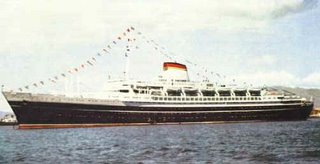
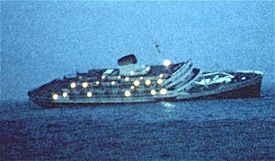
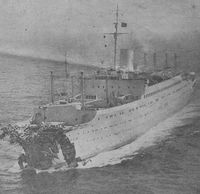

 Rose & Gwen 4th of August 2003
Rose & Gwen 4th of August 2003
 Eileen - 2005
Eileen - 2005
